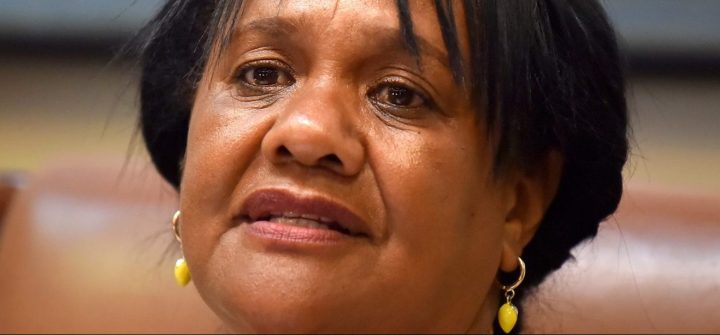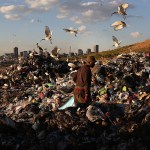BOIL BEFORE DRINKING
Nelson Mandela Bay Mayor office not keen to release water contamination results after E. coli scare

After the Eastern Cape’s biggest metro stopped residents from drinking tap water last week, saying it was unsafe, the spokesperson for Executive Mayor Eugene Johnson said on Tuesday there was no need for the mayor to resign as she had acted when there was a problem.
On Monday the Nelson Mandela Bay metro assured residents that the city’s water was safe to drink, but still refused access to official water results for the Democratic Alliance, which had applied for water results in terms of the Promotion of Access to Information Act (Paia).
It appears at this stage that the contamination of the metro’s drinking water happened at the Grassridge Temporary Treatment Works, which augments the city’s water supply that is running dangerously low because of an ongoing drought.
Tango Lamani, the spokesperson for Executive Mayor Eugene Johnson, said that to get access to water results residents can apply through the Paia and these results are also released to the municipal committee on public health.
Last week the metro said the city’s tap water was contaminated with E. coli bacteria and not safe to drink. Residents were urged to boil the water before consuming it or to add bleach.
In December, according to official municipal minutes, the metro’s compliance with safety standards was at 85%, with more than 50% of water testing points failing their water safety results.
On Monday, the council meeting was adjourned before water issues were discussed – despite a number of motions tabled in this regard.
The public health committee is scheduled to sit on Wednesday.
What exactly happened to contaminate the city’s drinking water remains unclear. Lamani said an investigation is under way and that the source of contamination had been identified as the Grassridge Temporary Treatment Works, which has since been isolated from the metro’s water reticulation system.
He said the metro communicated the water sampling results at a press conference on 24 February and communicates the state of the metro’s water monthly to the municipal council’s committee for public health.
“If full access to information is required, a legal process in terms of Paia will have to be followed.”

Last week the metro said the city’s tap water was contaminated with E. coli bacteria and not safe to drink. Residents were urged to boil the water before consuming it or to add bleach. (Photo: Deon Ferreira)
Asked if anybody would be held accountable for the water crisis, Lamani said the municipality’s effort at this time is to stabilise the situation and ensure that the provision of clean drinking water is restored.
“Investigations into the water quality incident are currently under way and corrective action, including consequence management, will have to be instituted in due course if the outcome of the investigation points to human error or negligence,” he said.
Officials and Johnson first claimed that the contamination of the metro’s drinking water was triggered by “low dam levels” caused by the ongoing drought. Lamani said water from the seven conventional water treatment works had met quality standards.
“The contamination came from the Grassridge Temporary Treatment Works, which is far north of Nelson Mandela Bay. The temporary treatment works is a drought intervention aspect to augment water being caused by drought.”
He said that the current crisis had not been caused by a shortage of water treatment chemicals.
“Nelson Mandela metro… has enough stock and back orders from suppliers. The metro makes use of a triannual tender for the supply of chemicals.”
He said they had 40 25kg drums available for manual chlorination and 40 on order, 9.6 tonnes of chlorine gas at Nooitgedacht alone and weekly orders are placed for delivery.
He said Johnson had been advised by the Public Health Directorate to provide the advice that people should add bleach to their water to make it drinkable.
The Mayoral Committee member for infrastructure and public works, Stag Mitchell, a member of the Northern Alliance who vowed accountability during his election campaign, said he wasn’t resigning either.
Mitchell said he “immediately enquired from the acting executive director and informed the executive mayor,” after it emerged that the metro’s water was contaminated.
He said that he had called for accountability, but “fortunately the executive mayor had already taken steps in this regard”.
Dr Juno Thomas, from the National Institute for Communicable Diseases, said while certain waterborne diseases must be reported to them, they had received none from Nelson Mandela Bay in the past two months.
The Eastern Cape Department of Health said three children from Kariega (formerly Uitenhage) were treated for E. coli infections in February and one had died. Last week, however, the metro said the incident could be traced back to a total water outage in the area and not to the supply of contaminated water.
“E. coli is one of the most well-adapted and versatile bacteria. There are many different ‘types’ of E. coli. The most common type is found in the gut of humans and other mammals; these types are called commensals because they are part of the normal gang of microorganisms (‘normal flora’) that live in the gut. They do not cause any disease, so are termed non-pathogenic,” Thomas explained.
She said the other types of E. coli caused disease in humans. They can be subdivided into two major groups: those that occur in the intestines and cause diarrhoea and those that cause disease outside of the intestines and do not cause diarrhoea but urinary tract infections, bloodstream infection and meningitis.
Thomas said people can be infected with E. coli by eating contaminated food, drinking contaminated water, contact with animals (companion animals, livestock, wild animals), contact with a contaminated environment (eg, soil which is contaminated with animal faeces) and can also spread from person to person.
She said disease caused by a bacteria called Stec (shiga toxin-producing E. coli), is notifiable in South Africa.
“However, cases of Stec are very infrequent in SA. Diseases caused by all other types of E. coli are not notifiable, so there is no data for these. Globally, extraintestinal pathogenic E. coli is one of the most common causes of urinary tract infections and is also an important cause of bloodstream infection in vulnerable patients, and meningitis in certain risk groups; this is no different in SA. So, at any one point, there will always be many patients of varying ages in hospitals throughout the country being treated for E. coli infections.
“We haven’t received any reports of suspected waterborne disease outbreaks (regardless of cause) from Nelson Mandela Bay Municipality in the last two months. We have not received any reports of a suspected increase in diarrhoea due to intestinal E. coli either,” she said.
“The E. coli that is tested for in water samples represents E. coli that is normally present in the gut of humans and animals, and normally shed in the faeces of humans and animals in large numbers.
“E. coli is called a ‘faecal indicator bacteria’ because its presence and concentration in a water sample gives an indication of whether or not the water may be contaminated with faeces (be it of human or animal origin). So, if for example, E. coli is detected in a drinking water sample, it suggests that there is faecal contamination of the water.
“In order to test for specific disease-causing microorganisms in water, specialised testing needs to be done. The presence of E. coli in a water sample does not mean that disease-causing pathogenic E. coli are present,” Thomas said. DM/MC
[hearken id=”daily-maverick/9226″]
















 Become an Insider
Become an Insider
African National Congress
Another National Catastrophe
Another No Comment
A Nuclear Calamity (…probably waiting in the wings)
“The Eastern Cape Department of Health said three children from Kariega (formerly Uitenhage) were treated for E. coli infections in February and one had died. Last week, however, the metro said the incident could be traced back to a total water outage in the area and not to the supply of contaminated water.” Either way – someone (The mayor?) should be charged for at least culpable homicide.